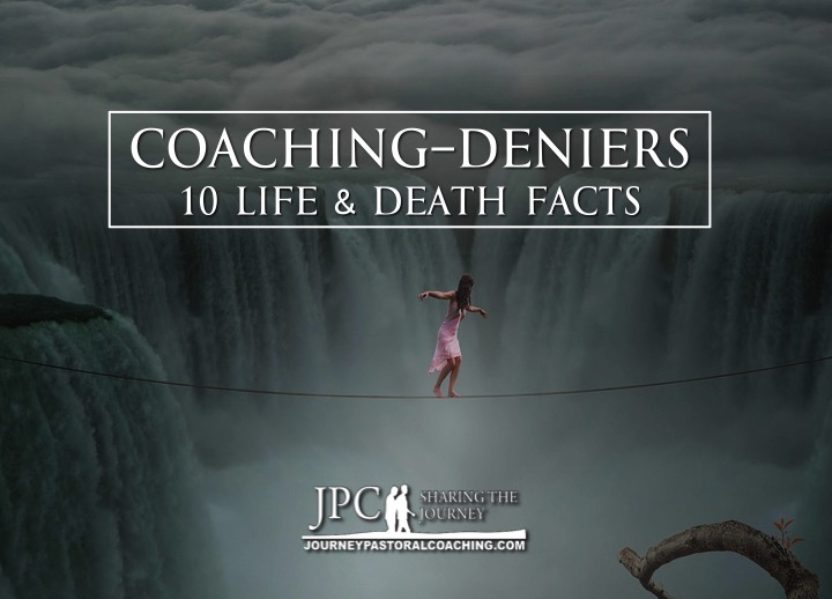Coaching Deniers: 10 Life & Death Facts
At Journey Pastoral Coaching we focus first on the minister, second on the ministry; first on being and then on doing. Being leads to doing. Therefore, as we give our attention to building the minister, we naturally build the ministry, and we do so for a lifetime of healthy and effective ministry. This is pastoral coaching.
Still, many are confused by pastoral coaching. Some reject it outright (even though they’ve had “coaches” all of their life in ministry). Let’s respectfully call them “coaching-deniers”: “But I AM a pastor; I don’t need a pastor.”
So, for all of the coaching deniers out there, “Why pastoral coaching (and yes, mentorship as well)?”
1. It’s in the Bible. In teaching and in example.
It’s how Jesus did ministry and it’s how He trained leaders – not just to get the most out of them during their time with Him, but for a lifetime. And for the kingdom. It’s how Jesus taught ministry should be done: Jesus to the 12 to Barnabas to Paul to Timothy and back to the 12 – it’s in there.
In fact, Jesus began His ministry with thousands, but intentionally whittled the numbers down to walk with just a few.
Why? Gordon MacDonald answers: “With a world of millions to reach, Jesus budgeted the majority of his time to be with just twelve simple men.”
2. It’s in the Bible because it’s in our DNA: God built us with a need for coaching-mentorship.
In his wonderful book, “They Smell Like Sheep,” Dr. Lynn Anderson says it this way:
“God has written the mentor concept into human nature and that is why the concept is written into the Bible.”
“Elders are generally older, more experienced, stronger memory members of the group to whom the younger look for identity. However, this role is conspicuously absent from modern American culture . . . Nevertheless, … we long for mentors. We seem to do better when they are in our lives. And when we don’t find positive mentors, by default, negative ones usually find us!”
3. Fewer young adults are entering vocational ministry.
In 2000, The average age of an ordained minister in the Assemblies of God (the denomination in which I am credentialed) was 55 years of age.
Today, the average age is 60 and growing a year older every four years. The fact that fewer young adults are entering vocational ministry is one important reason why.
From the “Did You Know” files: In the year 2000, 26.2% of all credentialedAG ministers were under 40 years of age. In 2017, that percentage stood at 20.8% – in spite of a call from national leadership for more young adults to enter vocational ministry AND the AG’s intentional revamping of college level education of ministers specifically to help see more young adults enter the ministry.
The decline in numbers is so serious that many denominations are now openly recruiting, asking young adults to consider a careerin ministry rather than encouraging them to seek God for His calling, whatever the vocation. Recruiting for a career in ministry is not the answer.
4. Fewer ministers are surviving in ministry
Nine of ten quality and called ministers who begin in ministry don’t cross the finish line in ministry.
The 5-10-5 Rule: 5 of 10 ministers quit in the first five years. In other words, if 4000 young adults enter the ministry today, 2000 of them will leave the ministry before New Year’s Day 2021.
To repeat: The average age of an ordained minister in the Assemblies of God (the denomination in which I am credentialed) is now 60 years of age and growing a year older every four years.
Intentions paint a rosy picture, but the stats tell the story: whatever we’re doing isn’t working. At what point then do we get concerned? When that average age of an ordained minister is 70? 80?
5. Fewer ministers are thriving in ministry. As ministers go, so go the ministries they lead.
“Many pastors confide to me that they are merely surviving. They feel incompetent to do what they are expected to do week after week. . . For many, the thought of thriving in ministry is a distant, unachievable dream. And yet, I know the Lord has called every pastor and ministry leader to experience the joy of thriving in ministry!” Jimmy Dodd, “Survive or Thrive”
“Seek out people wiser than yourself. Allow them to nurture and feed you. . . One hour spent with them can often provide encouragement that lasts weeks, months, or even years. Two hours with them will add several inches to your spiritual stature. . . Every minister should be able to identify at least two or three people who fulfill this place in his or her personal life.”José Luis Navajo, “Mondays With My Old Pastor”
Could it be that more attention to helping ministers thrive would help churches and ministries thrive? The studies say most certainly, yes.
6. Ministry is no longer primarily a contemplative life, but a complicated life.
Thirty years ago, pastors were seen as shepherds or spiritual leaders. Today they are expected to be leadership gurus, business CEOs, administrative phenoms, marketing experts, event planners, counselors, community facilitators, even entertainers. And shepherds.
Thirty years ago, pastors were expected to fill 5 basic roles. Today, it is 16. In my files I have a job description in which a local church specifies 26 primary tasks for a lead pastor: can you see the train wreck ahead – for that pastor and for that church?
Many pastors today struggle to juggle all of the roles thrust upon them. Struggle. Juggle. Coaches help them whittle down the “primary job roles” list, stop the juggling, and end the struggling. Coaches help them, and so their churches, learn just how healthy and vibrant a church can be when it returns to a biblical pastoral model.
7. It’s how the wisdom of experience and the “new thing in your day” are blended together in effective ministry of the Gospel of Jesus Christ.
Older minister, have you the humility to trust the young minister and his/her new ways?
Younger minister, have you the humility to trust the wisdom of the older minister?
Answer to both questions: how many members of “the other side” are you walking with? You each just might learn a thing or two – I know how much I learn from the young ministers I coach! Your ministry and our world just might be changed because of it.
8. It’s the future of church and ministry leadership
Decades ago, leadership in general and pastoral leadership in particular were vertical – top down decision-making. That has changed. And people – both leaders and followers – are very happy to hear it. Shared journeys in decision-making are producing leaders and churches that thrive. To its credit, Millennials are helping to drive this return to a New Testament model.
“Coaching will become the model for leaders in the future. Coaches teach, mentor, and empower.”Warren Bennis
“Of all vocations, surely the gospel ministry is the one whose paradigm is most radically formed by the dynamics of godly mentorship.”Stephen Baldwin
9. Burn-out. Depression. Hurting and broken ministry marriages.
Several surveys reveal that 100% of pastors have a close associate or friend from seminary who had left the ministry because of burnout, conflict in their church, or from a moral failure. 100%.
Have you followed the stories behind these surveys? Not the stats, but the stories of quality, competent, and committed young ministers who have walked away from the strong churches God used them to plant, lead and grow? The tasks these godly men and women take on are tough enough even when walking with a pastoral coach. They’re impossible to walk alone.
10. The heartfelt thank you I receive at the end of every coaching call. The waiting list on my desk of those who want to join Journey Pastoral Coaching.
This generation of young ministers is looking for seasoned ministers who will walk with them. This generation most needs and most wants solid pastoral coaching.
At Journey, we are always receiving new requests for coaching. I’ve had quality young adults in ministry tell me, “I’ve asked one, two, three, four, even five experienced pastors to walk with me, but no one will just walk with me – just walk with me and help me grow.” When we at Journey are finally able to squeeze them into our schedule, their heartfelt thank you after each call warms our hearts.
But then we see the list of those who wait and hope for a place. And our heart aches.
CONCLUSION:
Studies continually demonstrate that the single most effective step a minister can take to survive and thrive in ministry is to walk with a seasoned pastoral coach.
“You will never maximize your potential in any area without coaching. It is impossible. You may be good. You may even be better than everyone else. But without outside input you will never be as good as you could be.” Andy Stanley, “Next Generation Leader”
In his book, “Dangerous Calling,” author and pastor Paul David Tripp says it better than I ever could:
Pastor, it is plain and simple: you and I need to be pastored. One of the scandals of hordes of churches is that no one is pastoring their pastor. No one is helping him see what he is not seeing. No one is helping him examine his thoughts, desires, words, and behaviors. No one is regularly calling him to confession. No one is delineating where repentance is appropriate. No one is reaching into his discouragement with the truths of the presence, promises and provision of his Savior. No one is confronting his idolatry and pride. No one is alerting him to places of temptation and danger in his life.
So, if you’re now convinced that you need a pastoral coach, you need to make that call to an experienced minister near you or to a full-time pastoral coach.
If you’re still not convinced, you really need to make that call. See above for why, Superman.
___________________
NOTE: Journey Pastoral Coaching provides pastoral coaching to Millennial ministers.
Saddled with large student debt, just beginning to set up homes and start families, and serving in low paying first and second positions, Millennials are those who most desire but can least afford to pay for pastoral coaching.
So we offer it to them at NO COST: Our members do not PAY for coaching; they EARN it.
We are able to do so through the faithful and generous gifts of friends who want to see young leaders not only enter the ministry, but remain in the ministry. If you or your church would like to help Millennial ministers in 21 US states and 5 nations build strong for a lifetime in ministry, please click here to contact us by email or to support Journey monthly or with your one-time gift. Thank you.
We also invite you to click and subscribe to our twice-monthly blogs at journeypastoralcoaching.com
“In the early years when I was becoming a pastor, I needed a pastor.”
Eugene H. Peterson, The Pastor: A Memoir



